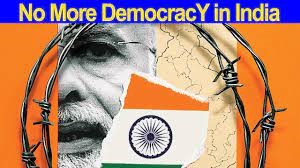By Komal Khan 27 May 2022
While discussing ‘identity’ as still appurtenant to the modern politics, Francis Fukuyama in his book “Identity: The Demand for Dignity and the Politics of Resentment” infers upon the application of identity in politics as still relevant. To Fukuyama, the reason for this is that despite the promises of dignity, human rights, and equality for all done by the liberal democracy, the fact on the practical front is that the liberal democracy has failed to deliver so. This is the most relevant to the communities with a history of past marginalization, hence, leading to the resurgence of nationalistic fervour affiliated with religion and race. This politics of identity based on above rationale makes nationalism and religion the prevalent forces that have been shaping the modern politics. Modi’s India is the prime case of it.
India proclaims the world’s largest democracy that is by and for the population of 1.39 billion people; claiming unity in a nationhood, living diversity, acknowledging its multi-religious make up, as well as ethno-cultural pluralism. The ethnic make-up of India is such that Hindus are 79.8% of the population; Muslims are 14.2%; Christians are 2.3%; Sikhs are 1.7%; Buddhists are 0.7%; and Jains are 0.4%. This ethnic pluralism in India oblige the Indian constitutional framework to uphold the principles of secularism and formal equality; and theoretically, at least, it did.
However, the religious freedom in India has been subjected to an inexplicit constitutional clause that is “subject to public order”. It legalizes suspension of the minority rights for national security, thus authorizing political abrogation of state secularism in India. With this constitutional crisis in practice which is contrary to the legitimate secular architecture of Indian constitution; the undergoing Hindu political engineering by Right-Wing politics in India is the cause of conflict amid Indian nationalism and human security situation of not only the Indian minorities, but of the intra-Hindu sub-sections as well. What is in need of being re-stressed is that the genesis of the ideology of ‘Hindu’ actually advocated the Hindu nationalism that is based on geographic affiliation, and not religious, acknowledging ethnic pluralism with substantive equality in relation to the ethnic minorities and majority residing in India.
In India today; the rise of Hindutva, or the neo-Hindutva, under the Modi’s BJP characterizes India as Hindu majoritarian polity. Hindutva has been assimilated in the Indian polity as a mainstreamed strategic culture by the Indian Prime Minister Narendra Modi since his election in 2014. The normative approach towards security and governance under the BJP has been taking into consideration the individual identities, rather than people collectively, as the referent of national security. However, under the international standards, the coherent human security occupies the referent status particularly in case of the state that proclaims to be the largest democracy in the world.
Human security in India reflects the ethno–cultural and geostrategic adaptation of Hindutva. In cultural aspects, the Indian minorities have been ordered in a hierarchical pattern, though this pattern of hierarchy is a historical stratification. However, the existing political order in India has complicated this very relationship to make sure their acculturation in Hindutva-majority normative framework, such Animal preservation Amendment, no- religious conversion ordinance, Uniform Civil Code instead of Muslim Personal Law and many alike as measures of social control against Muslim minority. This Hindu-specific social order to the extremity includes policies of that declare the minorities stateless in India. This has been done under the Citizen Amendment Act (CAA), and National Population Register (NPR) 2019-2020; under the Pan Indian National Registration of Citizen law (NRC).
These constitutional measures indicate BJP initiated ethnocentric politics of the Hindutva constitutionalism. However, Article 15 of the Indian Constitution provides for the freedom of religion and the right to profess, practice and propagate religions ad inalienable right of citizens in India. Similarly, Article 14 and 25 to 28 of the Indian constitution legally bound the government of India to treat equally and impartially every religion in India without any discrimination and prohibit meddling in their religious affairs.
The Institute of Peace and Conflict Studies (IPCS) based in India identifies the intensifying communal violence to the identity-occupied shift in Indian politics, notably the political application of the Hindu Nationalism by populist political parties. Similarly, the report in 2020 by the United States Commission on International Religious Freedom keeps India in Tier 2 over the current status of religious freedom abuses in India. As per the report, the previously upheld constitutional rights that had been guaranteed to the religious minorities of India since independence, are in a state of gradual erosion in present India. Similarly, multiple reports of the United Nations Human Rights Watch since 2020 raise concerns over deteriorating human rights state in India.
India has a history of sensitivity to the identity politics. Previously, the consequences of the politics of divide and rule have been witnessed in the Gujarat massacre that followed the Babri Mosque demolition and was supported by the BJP, the Shiv Sena, and the VHP in 1992 leading to about 2000 deaths; moreover, during the clashes between Hindu Jatts and Muslims in Muzaffarnagar, in the state of Uttar Pradesh (UP) in 2013 that left 62 dead, 93 wounded and 50,000 displaced internally displaced people.
Since the present Hindu majoritarian politics of Hindutva or the modified Hindu nationalism is a cause of human rights violations, either as intended or unintentional consequences of populist governance model in India , it has worrisome implications on human security in India.
* The writer is working as a Research Officer at the Strategic Vision Institute (SVI), a non-partisan think-tank based out of Islamabad, Pakistan.

